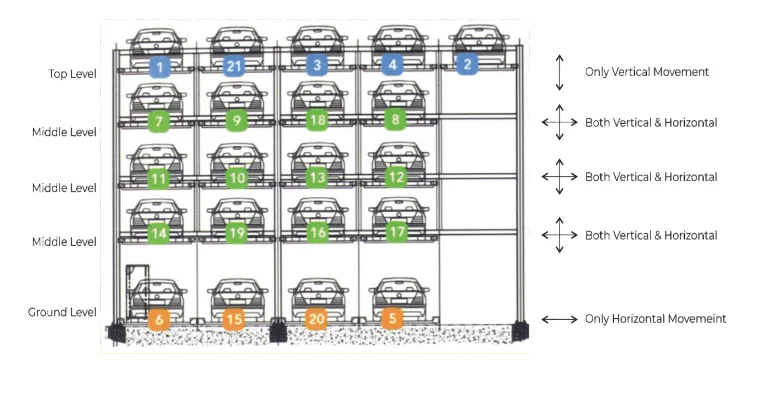India’s urban population is growing faster than ever. With this surge, cities are becoming more congested. One of the most visible issues in these smart cities is the shortage of parking spaces. As cars increase, traditional parking lots no longer meet urban needs. In this context, Puzzle Parking Systems in Mumbai are emerging as a practical solution.
They are compact, efficient, and designed to optimize vertical and horizontal space. But why are they becoming so popular? And what makes them a true game changer for smart cities like Mumbai? Let’s dive deep into it.
The Urban Parking Crisis
Mumbai faces space constraints, much like the majority of India’s major cities. The parking issue has gotten worse due to unprepared infrastructure, high car density, and narrow roads. In search of a parking, residents frequently circle around for many minutes. Ground-level parking and basement space are scarce in commercial buildings. Both municipal planners and car owners find the situation frustrating.
Puzzle parking systems in Mumbai are more than just a luxury in these situations; they are essential. They permit the parking of several vehicles in a constrained space. This contemporary strategy provides an organised approach to urban transportation and lessens reliance on manual parking techniques.
What Exactly is a Puzzle Parking System?
A puzzle parking system is a semi-automated, mechanical device. Cars are stacked both horizontally and vertically. Its distinctive shifting mechanism is the source of the term “puzzle”. To provide room for people to enter or exit, cars can be shifted sideways, up, or down. Drivers do not have to navigate their vehicles into tight curves, and ramps are not required.
These systems are perfect for public parking lots, shopping centres, hospitals, offices, and residential communities. Puzzle Parking Systems in Mumbai provides a system that strikes a mix between technology, safety, and convenience for individuals looking for intelligent and effective parking solutions.
Solving the Space Crunch in Mumbai
The cost of real estate in Mumbai is extremely high. Every square foot matters. Making the most of your available space is crucial, whether you’re a housing society or a developer. A conventional parking arrangement eats up valuable space. The number of automobiles in the same spot, however, can be doubled or even tripled with a puzzle parking system.
Puzzle Parking Systems in Mumbai are a wise investment because of their space-saving feature. Large areas of land no longer need to be set aside by builders for parking. The same need can be met in a lot less space by using mechanical systems instead.
Smart Cities Need Smart Parking
India’s urban life is being transformed by the smart city initiative. These cities are built to be tech-savvy, sustainable, and prepared for the future. But even the most intelligent cities fail if the parking issue is not resolved. Let’s talk about puzzle parking systems.
They are ideal for the smart city framework because of their small size, low power consumption, and automation characteristics. Mumbai’s Puzzle Parking Systems are helping to enhance land use, traffic flow, and street cleanliness.
Furthermore, these systems can potentially be controlled by apps or smart cards as digital infrastructure becomes more and more ingrained in our daily lives. Better control and an improved user experience result from this.
Convenience and Accessibility
Ease of use is one of the main issues that car owners have. No one wants to strain to reverse in confined spaces or wait interminably. The process runs well thanks to puzzle parking. Users only need to park at the entrance bay because it automatically moves cars as needed.
These technologies can also be tailored to the needs of the user. For residential buildings or business centers, Mumbai’s Puzzle Parking Systems provide unparalleled versatility. Additionally, compared to open parking places, they are frequently safer and more secure.
Cost-Effective in the Long Run
Puzzle parking could seem like a significant financial commitment at first. Eventually, though, it saves money. By reducing the amount of land needed for parking, builders can lower construction costs. Societies save money on land taxes, upkeep, and personnel. In addition, these systems need less ventilation and lighting than huge subterranean basements.
Puzzle Parking Systems in Mumbai are affordable because of all these aspects. Users are guaranteed peace of mind because of the low maintenance requirements and the fact that many models come with warranties and AMC assistance.
Safe and Secure
Another important consideration is security, particularly in apartment buildings. Unauthorised access is decreased by puzzle parking. There is no chance of auto theft, vandalism, or unintentional damage because the cars are housed mechanically. The system can only be accessed by authorised users.
The majority of Mumbai’s puzzle parking systems are also made with ventilation, drainage, and fire safety in mind. They are perfect for residential and commercial settings in India because they adhere to safety and urban planning regulations.
Supporting Real Estate Development
Smart amenities are becoming more and more in demand as real estate keeps growing. Nowadays, parking is a crucial factor in determining a property’s value. A house with contemporary parking options has a higher chance of attracting buyers.
In order to draw in high-end consumers, developers in Mumbai are choosing to use Puzzle Parking Systems in Mumbai. These systems give the project a competitive edge in the market and increase its worth.
Puzzle parking systems are a crucial component of urban development, not only a contemporary convenience. Mumbai is at the forefront, but other cities are catching up. It’s time to think about this ground-breaking parking option, whether you’re a commercial planner, a society member, or a real estate developer.
Mumbai’s Puzzle Parking Systems are revolutionising our understanding of movement, space, and urban planning. They address one of the most important urban problems, parking, and are in line with our country’s smart city ambitions. These systems are becoming an essential component of the contemporary Indian metropolis as more individuals and institutions realise their worth.







